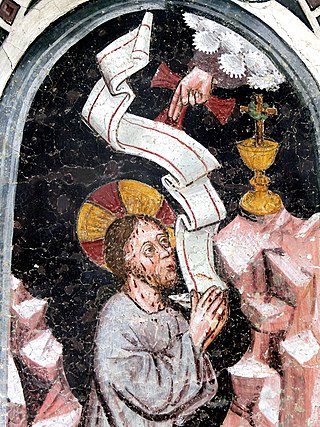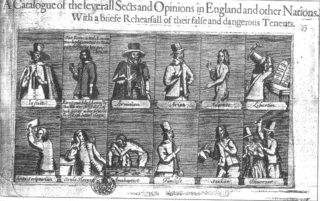Anabaptism is a Christian movement which traces its origins to the Radical Reformation in the 16th century. Anabaptists believe that baptism is valid only when candidates freely confess their faith in Christ and request to be baptized. Commonly referred to as believer's baptism, it is opposed to baptism of infants, who are not able to make a conscious decision to be baptized.
In church history, the term acephali has been applied to several sects that supposedly had no leader. E. Cobham Brewer wrote, in Dictionary of Phrase and Fable, that acephalites, "properly means men without a head." Jean Cooper wrote, in Dictionary of Christianity, that it characterizes "various schismatical Christian bodies". Among them were Nestorians who rejected the Council of Ephesus’ condemnation of Patriarch Nestorius of Constantinople, which deposed Nestorius and declared him a heretic.

In religion and theology, revelation is the disclosing of some form of truth or knowledge through communication with a deity (god) or other supernatural entity or entities.

A spiritual gift or charism is an extraordinary power given by the Holy Spirit. These are believed by followers to be supernatural graces that individual Christians need to fulfill the mission of the Church. In the narrowest sense, it is a theological term for the extraordinary graces given to individual Christians for the good of others and is distinguished from the graces given for personal sanctification, such as the Seven Gifts of the Holy Spirit and the fruit of the Holy Spirit.
Nicolaism was an early Christian sect mentioned twice in the Book of Revelation of the New Testament. The adherents were called Nicolaitans, Nicolaitanes, or Nicolaites. They were considered heretical by the mainstream early Christian Church. According to Revelation 2:6 and 15, they were known in the cities of Ephesus and Pergamum. In this chapter, the church at Ephesus is endorsed for "[hating] the works of the Nicolaites, which I also hate"; and the church in Pergamos is rebuked: "So thou hast also some [worshiping in their midst] who hold the teaching of the Nicolaites". In the original Greek, they are called Νικολαϊτῶν (Nikolaitōn).

Menno Simons was a Roman Catholic priest from the Friesland region of the Low Countries who was excommunicated from the Catholic Church and became an influential Anabaptist religious leader. Simons was a contemporary of the Protestant Reformers and it is from his name that his followers became known as Mennonites.

Sebastian Franck was a 16th-century German freethinker, humanist, and radical reformer.
BernhardRothmann was a 16th-century radical and Anabaptist leader in the city of Münster. He was born in Stadtlohn, Westphalia, around 1495.

In Christian theology, synergism is the belief that salvation involves some form of cooperation between divine grace and human freedom. Synergism is upheld by the Catholic Church, Eastern Orthodox Churches, Oriental Orthodox Churches, Anabaptist Churches and Methodist Churches. It is an integral part of Arminian theology common in the General Baptist and Methodist traditions.
Peter of Bruys was a medieval French religious teacher. He was called a heresiarch by the Roman Catholic Church because he opposed infant baptism, the erecting of churches and the veneration of crosses, the doctrine of transubstantiation and prayers for the dead. An angry Roman Catholic mob murdered him in or around 1131.
Nikolaus Storch was a German weaver and radical lay-preacher in the Saxon town of Zwickau. He and his followers, known as the Zwickau Prophets, played a brief role during the early German Reformation years in south-east Saxony, and there is a view that he was a forerunner of the Anabaptists. In the years 1520–1521, he worked closely with the radical theologian Thomas Müntzer.

English Dissenters or English Separatists were Protestants who separated from the Church of England in the 17th and 18th centuries. A dissenter is one who disagrees in opinion, belief and other matters. English Dissenters opposed state interference in religious matters and founded their own churches, educational establishments and communities.
The existence of philosophical sin was a debate waged in the Catholic Church in the late seventeenth century. A philosophical sin is a morally bad act which violates the natural order of reason, not the divine law. The idea of philosophical sin, as opposed to theological sin, was advocated by those who wished to construct a moral system independent of God.
The Agnoetae or Themistians were a Monophysite Christian sect of Late Antiquity that maintained that the nature of Jesus Christ was like other men's in all respects, including limited knowledge despite being divine.
Artemon, a prominent Christian teacher in Rome, who held Adoptionist, or Nontrinitarian views. Little is known about his life.
Audianism, or Anthropomorphism, was a sect of Christians in the 4th century in Syria and the Pontic–Caspian steppe, named after its founder Audius or Audaeus, who interpreted the text of the First Epistle to Timothy 3:16 to mean that God created humanity in his image in a literal physical sense.
Qui pluribus is an encyclical promulgated by Pope Pius IX on 9 November 1846. It was the first encyclical of his reign and written to urge the prelates to be on guard against the dangers posed by rationalism, pantheism, socialism, communism and other popular philosophies. It was a commentary on the widespread civil unrest spreading across Italy, as nationalists with a variety of beliefs and methods sought the unification of Italy.
A schism is a division between people, usually belonging to an organization, movement, or religious denomination. The word is most frequently applied to a split in what had previously been a single religious body, such as the Great East–West Schism or the Western Schism. It is also used of a split within a non-religious organization or movement or, more broadly, of a separation between two or more people, be it brothers, friends, lovers, etc.

Divine judgment means the judgment of God or other supreme beings and deities within a religion or a spiritual belief.

The Society of the Holy Name, formally known as the Confraternity of the Most Holy Name of God and Jesus, is a Roman Catholic confraternity of the laity and is one of several which are under the care of the Dominican Order. It is open to all Catholic adults. The primary object of the society is to beget reverence for the Holy Name of God and Jesus Christ; it is also dedicated to making reparations, in particular, for blasphemy, perjury and immorality.








